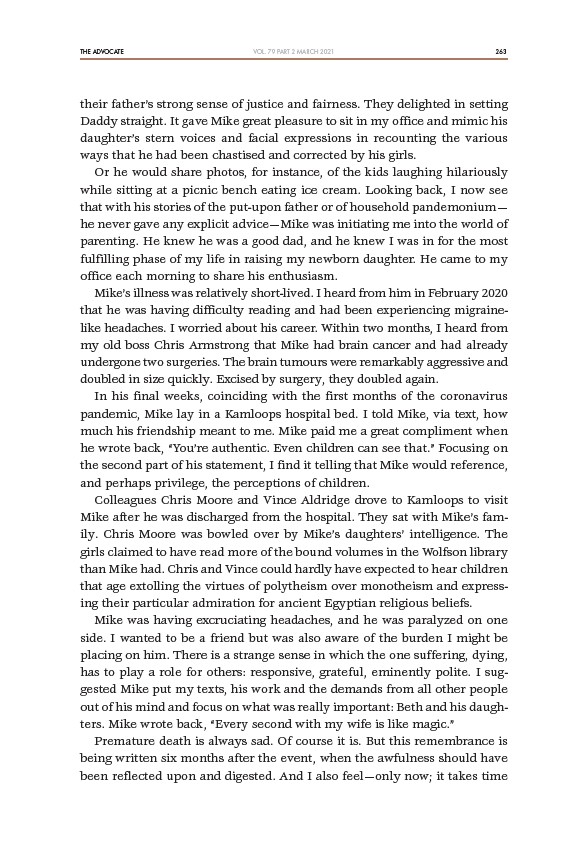
THE ADVOCATE 263
VOL. 79 PART 2 MARCH 2021
their father’s strong sense of justice and fairness. They delighted in setting
Daddy straight. It gave Mike great pleasure to sit in my office and mimic his
daughter’s stern voices and facial expressions in recounting the various
ways that he had been chastised and corrected by his girls.
Or he would share photos, for instance, of the kids laughing hilariously
while sitting at a picnic bench eating ice cream. Looking back, I now see
that with his stories of the put-upon father or of household pandemonium—
he never gave any explicit advice—Mike was initiating me into the world of
parenting. He knew he was a good dad, and he knew I was in for the most
fulfilling phase of my life in raising my newborn daughter. He came to my
office each morning to share his enthusiasm.
Mike’s illness was relatively short-lived. I heard from him in February 2020
that he was having difficulty reading and had been experiencing migrainelike
headaches. I worried about his career. Within two months, I heard from
my old boss Chris Armstrong that Mike had brain cancer and had already
undergone two surgeries. The brain tumours were remarkably aggressive and
doubled in size quickly. Excised by surgery, they doubled again.
In his final weeks, coinciding with the first months of the coronavirus
pandemic, Mike lay in a Kamloops hospital bed. I told Mike, via text, how
much his friendship meant to me. Mike paid me a great compliment when
he wrote back, “You’re authentic. Even children can see that.” Focusing on
the second part of his statement, I find it telling that Mike would reference,
and perhaps privilege, the perceptions of children.
Colleagues Chris Moore and Vince Aldridge drove to Kamloops to visit
Mike after he was discharged from the hospital. They sat with Mike’s family.
Chris Moore was bowled over by Mike’s daughters’ intelligence. The
girls claimed to have read more of the bound volumes in the Wolfson library
than Mike had. Chris and Vince could hardly have expected to hear children
that age extolling the virtues of polytheism over monotheism and expressing
their particular admiration for ancient Egyptian religious beliefs.
Mike was having excruciating headaches, and he was paralyzed on one
side. I wanted to be a friend but was also aware of the burden I might be
placing on him. There is a strange sense in which the one suffering, dying,
has to play a role for others: responsive, grateful, eminently polite. I suggested
Mike put my texts, his work and the demands from all other people
out of his mind and focus on what was really important: Beth and his daughters.
Mike wrote back, “Every second with my wife is like magic.”
Premature death is always sad. Of course it is. But this remembrance is
being written six months after the event, when the awfulness should have
been reflected upon and digested. And I also feel—only now; it takes time